The Factual Specifics of the Case
VerifiedAdded on 2022/09/14
|6
|1268
|11
AI Summary
Contribute Materials
Your contribution can guide someone’s learning journey. Share your
documents today.
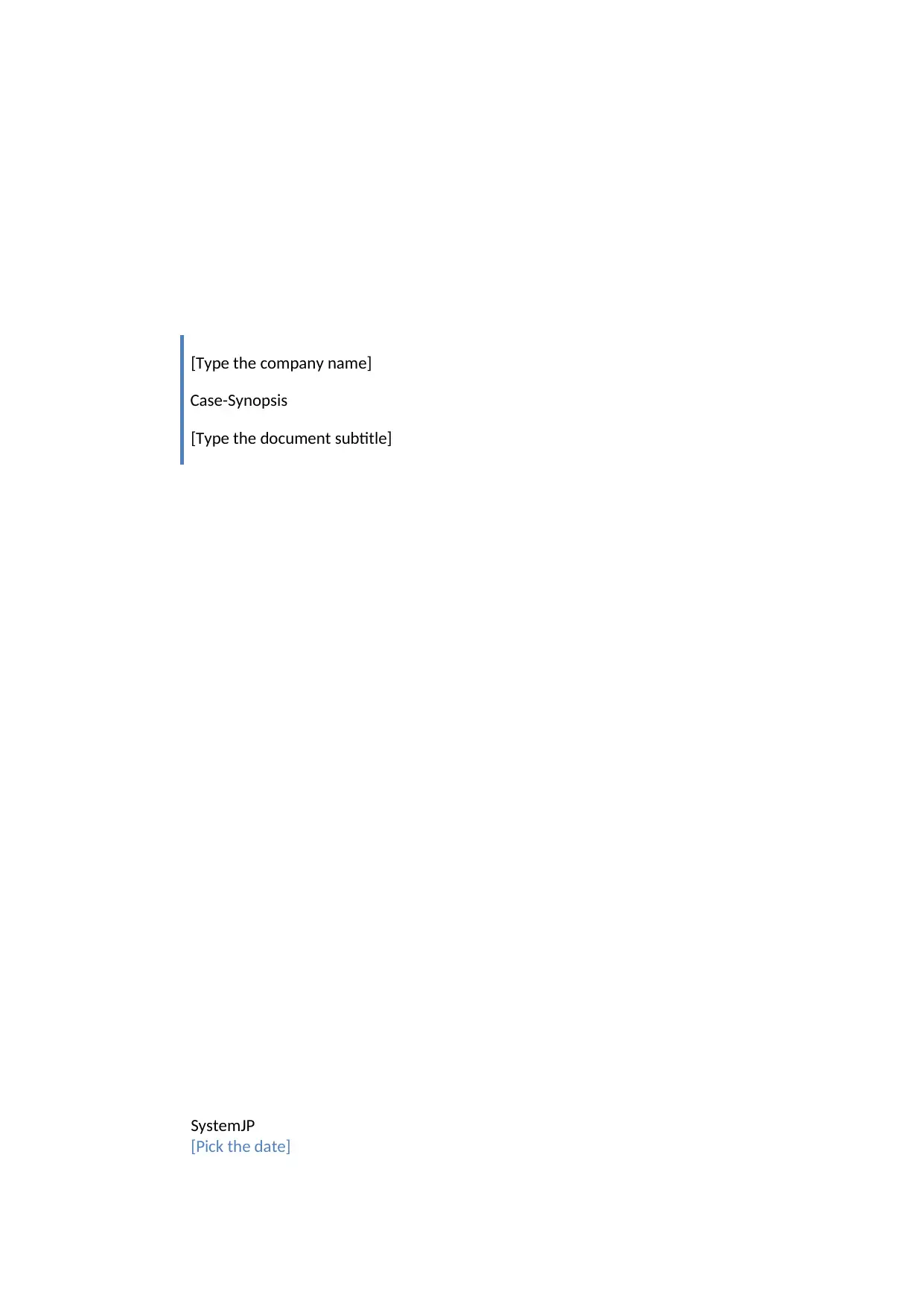
[Type the company name]
Case-Synopsis
[Type the document subtitle]
SystemJP
[Pick the date]
Case-Synopsis
[Type the document subtitle]
SystemJP
[Pick the date]
Secure Best Marks with AI Grader
Need help grading? Try our AI Grader for instant feedback on your assignments.
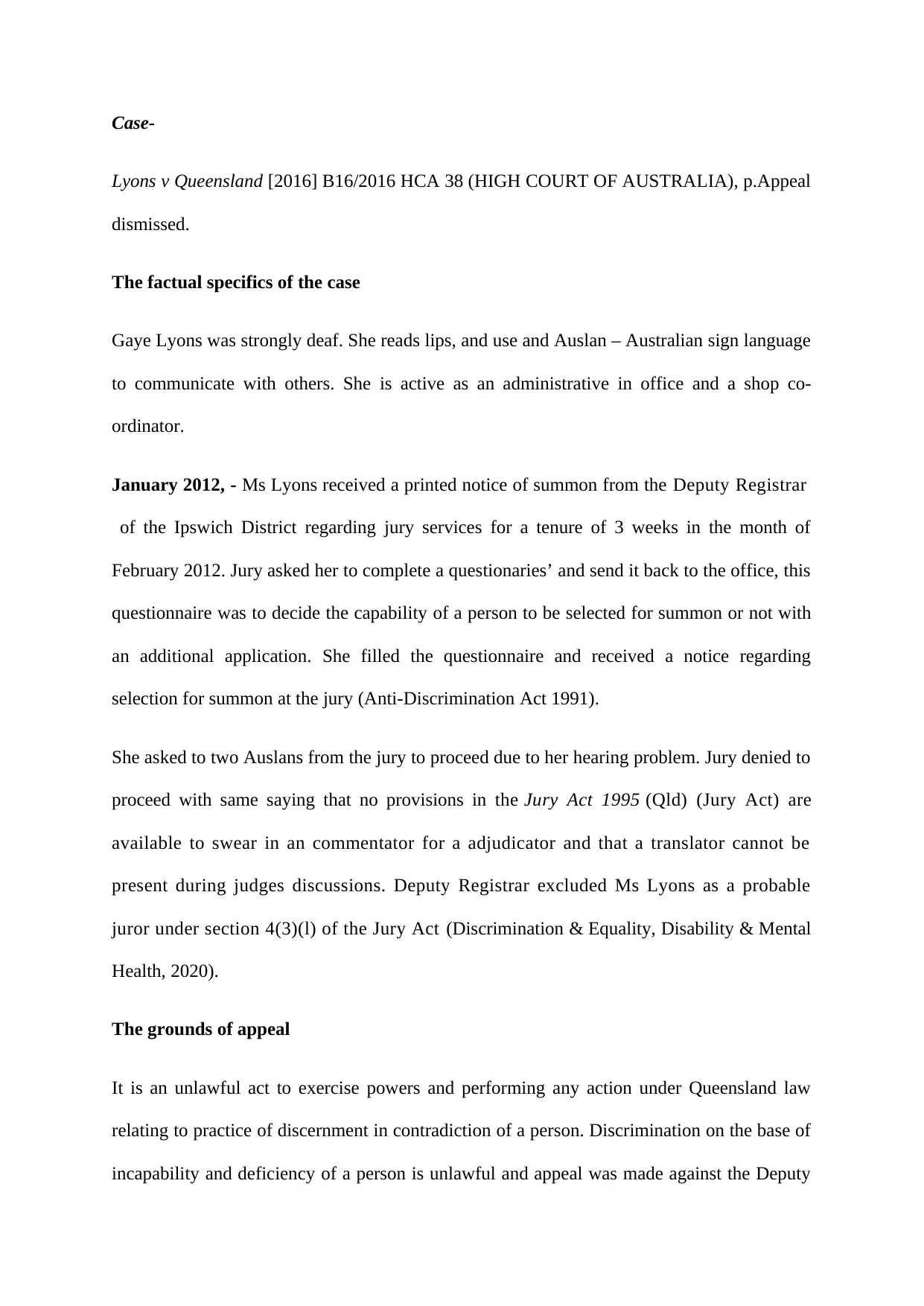
Case-
Lyons v Queensland [2016] B16/2016 HCA 38 (HIGH COURT OF AUSTRALIA), p.Appeal
dismissed.
The factual specifics of the case
Gaye Lyons was strongly deaf. She reads lips, and use and Auslan – Australian sign language
to communicate with others. She is active as an administrative in office and a shop co-
ordinator.
January 2012, - Ms Lyons received a printed notice of summon from the Deputy Registrar
of the Ipswich District regarding jury services for a tenure of 3 weeks in the month of
February 2012. Jury asked her to complete a questionaries’ and send it back to the office, this
questionnaire was to decide the capability of a person to be selected for summon or not with
an additional application. She filled the questionnaire and received a notice regarding
selection for summon at the jury (Anti-Discrimination Act 1991).
She asked to two Auslans from the jury to proceed due to her hearing problem. Jury denied to
proceed with same saying that no provisions in the Jury Act 1995 (Qld) (Jury Act) are
available to swear in an commentator for a adjudicator and that a translator cannot be
present during judges discussions. Deputy Registrar excluded Ms Lyons as a probable
juror under section 4(3)(l) of the Jury Act (Discrimination & Equality, Disability & Mental
Health, 2020).
The grounds of appeal
It is an unlawful act to exercise powers and performing any action under Queensland law
relating to practice of discernment in contradiction of a person. Discrimination on the base of
incapability and deficiency of a person is unlawful and appeal was made against the Deputy
Lyons v Queensland [2016] B16/2016 HCA 38 (HIGH COURT OF AUSTRALIA), p.Appeal
dismissed.
The factual specifics of the case
Gaye Lyons was strongly deaf. She reads lips, and use and Auslan – Australian sign language
to communicate with others. She is active as an administrative in office and a shop co-
ordinator.
January 2012, - Ms Lyons received a printed notice of summon from the Deputy Registrar
of the Ipswich District regarding jury services for a tenure of 3 weeks in the month of
February 2012. Jury asked her to complete a questionaries’ and send it back to the office, this
questionnaire was to decide the capability of a person to be selected for summon or not with
an additional application. She filled the questionnaire and received a notice regarding
selection for summon at the jury (Anti-Discrimination Act 1991).
She asked to two Auslans from the jury to proceed due to her hearing problem. Jury denied to
proceed with same saying that no provisions in the Jury Act 1995 (Qld) (Jury Act) are
available to swear in an commentator for a adjudicator and that a translator cannot be
present during judges discussions. Deputy Registrar excluded Ms Lyons as a probable
juror under section 4(3)(l) of the Jury Act (Discrimination & Equality, Disability & Mental
Health, 2020).
The grounds of appeal
It is an unlawful act to exercise powers and performing any action under Queensland law
relating to practice of discernment in contradiction of a person. Discrimination on the base of
incapability and deficiency of a person is unlawful and appeal was made against the Deputy
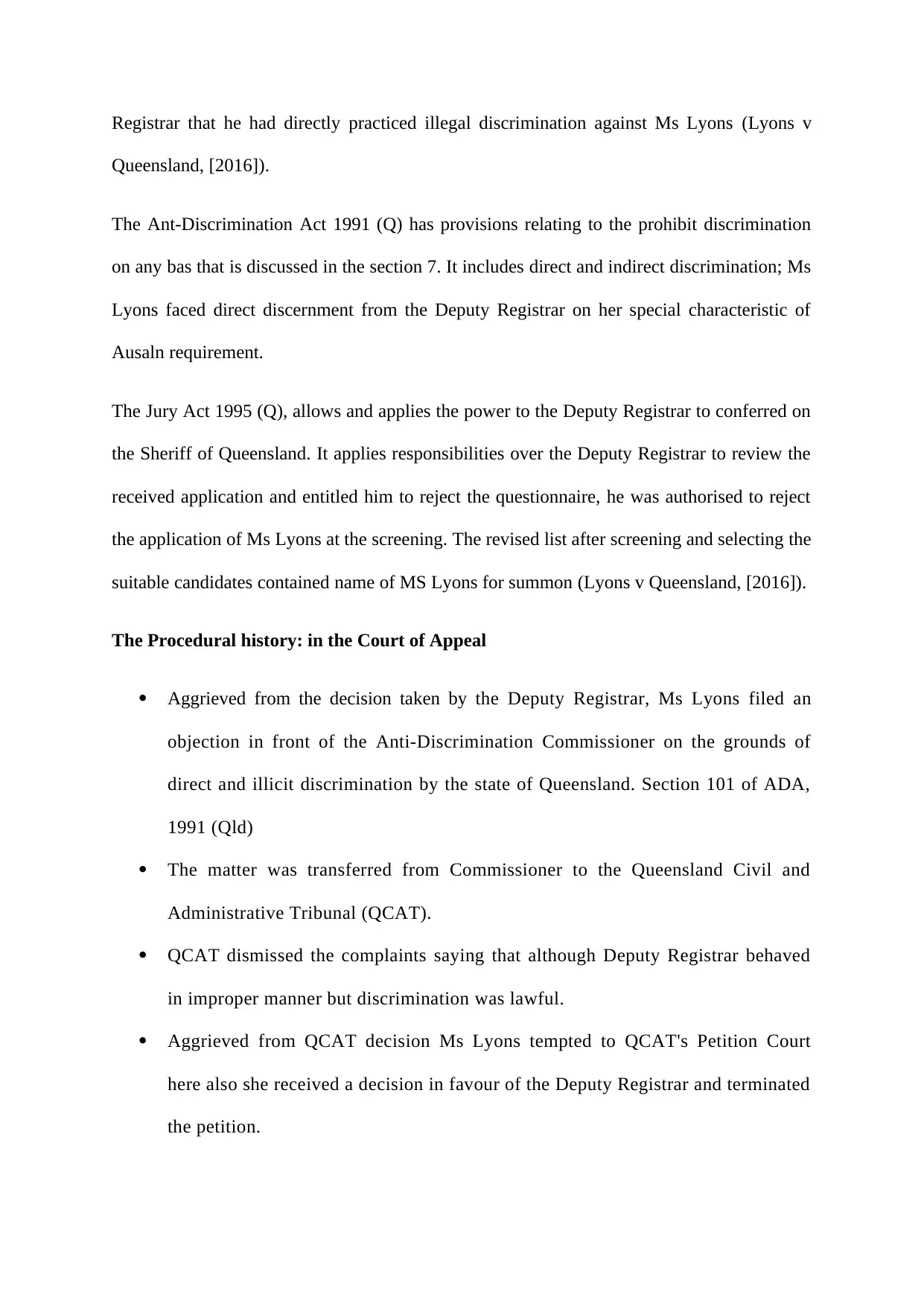
Registrar that he had directly practiced illegal discrimination against Ms Lyons (Lyons v
Queensland, [2016]).
The Ant-Discrimination Act 1991 (Q) has provisions relating to the prohibit discrimination
on any bas that is discussed in the section 7. It includes direct and indirect discrimination; Ms
Lyons faced direct discernment from the Deputy Registrar on her special characteristic of
Ausaln requirement.
The Jury Act 1995 (Q), allows and applies the power to the Deputy Registrar to conferred on
the Sheriff of Queensland. It applies responsibilities over the Deputy Registrar to review the
received application and entitled him to reject the questionnaire, he was authorised to reject
the application of Ms Lyons at the screening. The revised list after screening and selecting the
suitable candidates contained name of MS Lyons for summon (Lyons v Queensland, [2016]).
The Procedural history: in the Court of Appeal
Aggrieved from the decision taken by the Deputy Registrar, Ms Lyons filed an
objection in front of the Anti-Discrimination Commissioner on the grounds of
direct and illicit discrimination by the state of Queensland. Section 101 of ADA,
1991 (Qld)
The matter was transferred from Commissioner to the Queensland Civil and
Administrative Tribunal (QCAT).
QCAT dismissed the complaints saying that although Deputy Registrar behaved
in improper manner but discrimination was lawful.
Aggrieved from QCAT decision Ms Lyons tempted to QCAT's Petition Court
here also she received a decision in favour of the Deputy Registrar and terminated
the petition.
Queensland, [2016]).
The Ant-Discrimination Act 1991 (Q) has provisions relating to the prohibit discrimination
on any bas that is discussed in the section 7. It includes direct and indirect discrimination; Ms
Lyons faced direct discernment from the Deputy Registrar on her special characteristic of
Ausaln requirement.
The Jury Act 1995 (Q), allows and applies the power to the Deputy Registrar to conferred on
the Sheriff of Queensland. It applies responsibilities over the Deputy Registrar to review the
received application and entitled him to reject the questionnaire, he was authorised to reject
the application of Ms Lyons at the screening. The revised list after screening and selecting the
suitable candidates contained name of MS Lyons for summon (Lyons v Queensland, [2016]).
The Procedural history: in the Court of Appeal
Aggrieved from the decision taken by the Deputy Registrar, Ms Lyons filed an
objection in front of the Anti-Discrimination Commissioner on the grounds of
direct and illicit discrimination by the state of Queensland. Section 101 of ADA,
1991 (Qld)
The matter was transferred from Commissioner to the Queensland Civil and
Administrative Tribunal (QCAT).
QCAT dismissed the complaints saying that although Deputy Registrar behaved
in improper manner but discrimination was lawful.
Aggrieved from QCAT decision Ms Lyons tempted to QCAT's Petition Court
here also she received a decision in favour of the Deputy Registrar and terminated
the petition.
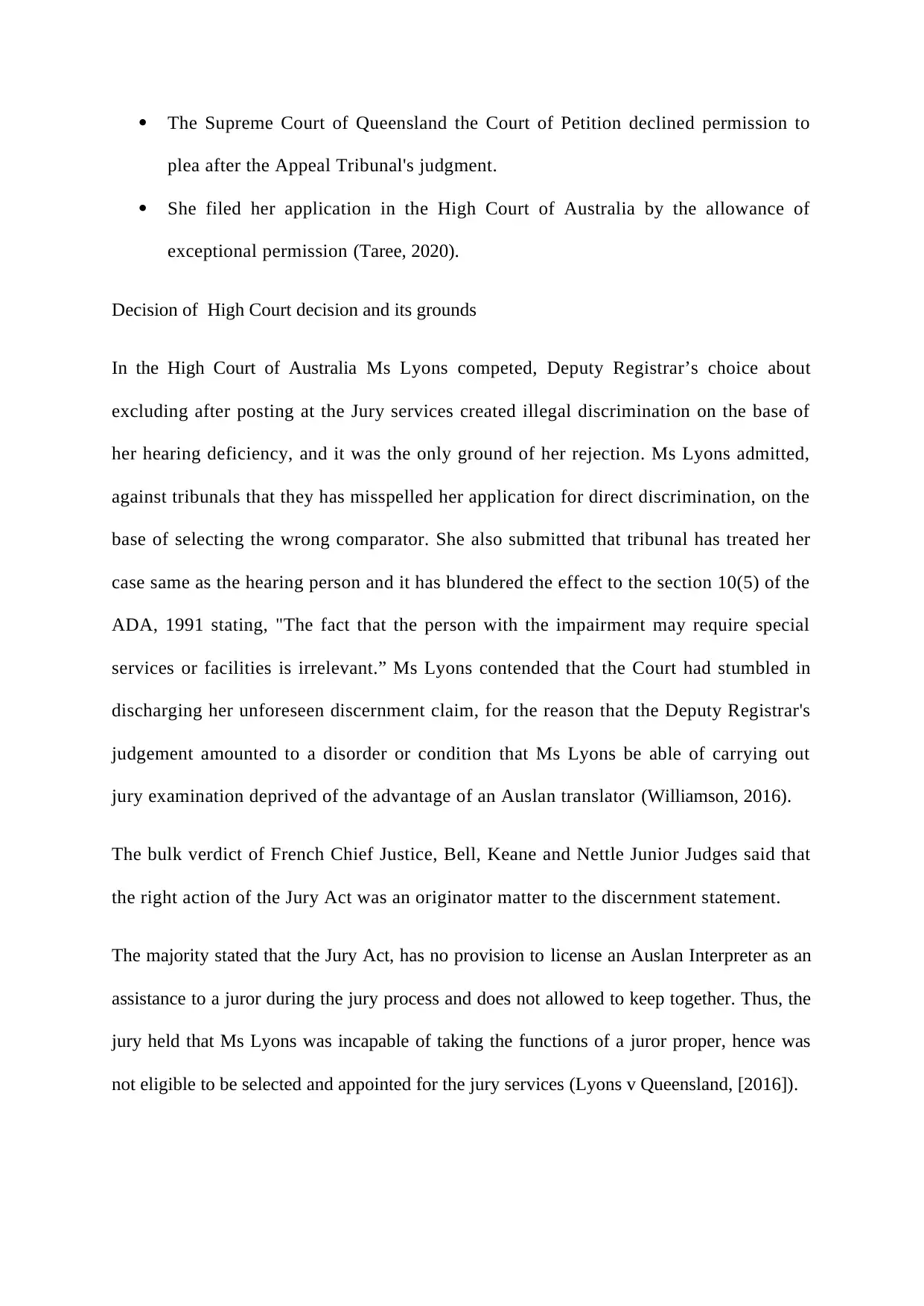
The Supreme Court of Queensland the Court of Petition declined permission to
plea after the Appeal Tribunal's judgment.
She filed her application in the High Court of Australia by the allowance of
exceptional permission (Taree, 2020).
Decision of High Court decision and its grounds
In the High Court of Australia Ms Lyons competed, Deputy Registrar’s choice about
excluding after posting at the Jury services created illegal discrimination on the base of
her hearing deficiency, and it was the only ground of her rejection. Ms Lyons admitted,
against tribunals that they has misspelled her application for direct discrimination, on the
base of selecting the wrong comparator. She also submitted that tribunal has treated her
case same as the hearing person and it has blundered the effect to the section 10(5) of the
ADA, 1991 stating, "The fact that the person with the impairment may require special
services or facilities is irrelevant.” Ms Lyons contended that the Court had stumbled in
discharging her unforeseen discernment claim, for the reason that the Deputy Registrar's
judgement amounted to a disorder or condition that Ms Lyons be able of carrying out
jury examination deprived of the advantage of an Auslan translator (Williamson, 2016).
The bulk verdict of French Chief Justice, Bell, Keane and Nettle Junior Judges said that
the right action of the Jury Act was an originator matter to the discernment statement.
The majority stated that the Jury Act, has no provision to license an Auslan Interpreter as an
assistance to a juror during the jury process and does not allowed to keep together. Thus, the
jury held that Ms Lyons was incapable of taking the functions of a juror proper, hence was
not eligible to be selected and appointed for the jury services (Lyons v Queensland, [2016]).
plea after the Appeal Tribunal's judgment.
She filed her application in the High Court of Australia by the allowance of
exceptional permission (Taree, 2020).
Decision of High Court decision and its grounds
In the High Court of Australia Ms Lyons competed, Deputy Registrar’s choice about
excluding after posting at the Jury services created illegal discrimination on the base of
her hearing deficiency, and it was the only ground of her rejection. Ms Lyons admitted,
against tribunals that they has misspelled her application for direct discrimination, on the
base of selecting the wrong comparator. She also submitted that tribunal has treated her
case same as the hearing person and it has blundered the effect to the section 10(5) of the
ADA, 1991 stating, "The fact that the person with the impairment may require special
services or facilities is irrelevant.” Ms Lyons contended that the Court had stumbled in
discharging her unforeseen discernment claim, for the reason that the Deputy Registrar's
judgement amounted to a disorder or condition that Ms Lyons be able of carrying out
jury examination deprived of the advantage of an Auslan translator (Williamson, 2016).
The bulk verdict of French Chief Justice, Bell, Keane and Nettle Junior Judges said that
the right action of the Jury Act was an originator matter to the discernment statement.
The majority stated that the Jury Act, has no provision to license an Auslan Interpreter as an
assistance to a juror during the jury process and does not allowed to keep together. Thus, the
jury held that Ms Lyons was incapable of taking the functions of a juror proper, hence was
not eligible to be selected and appointed for the jury services (Lyons v Queensland, [2016]).
Secure Best Marks with AI Grader
Need help grading? Try our AI Grader for instant feedback on your assignments.
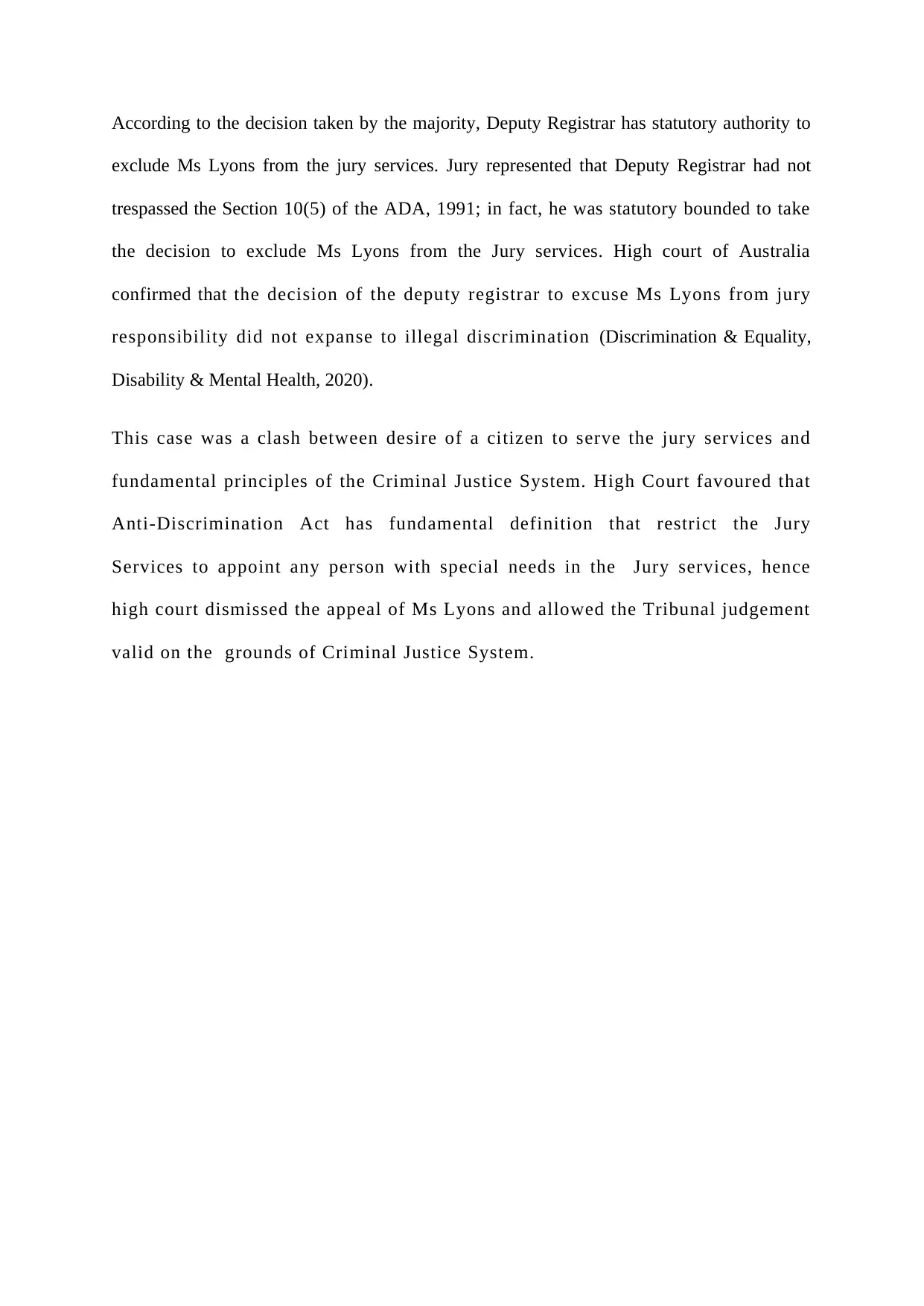
According to the decision taken by the majority, Deputy Registrar has statutory authority to
exclude Ms Lyons from the jury services. Jury represented that Deputy Registrar had not
trespassed the Section 10(5) of the ADA, 1991; in fact, he was statutory bounded to take
the decision to exclude Ms Lyons from the Jury services. High court of Australia
confirmed that the decision of the deputy registrar to excuse Ms Lyons from jury
responsibility did not expanse to illegal discrimination (Discrimination & Equality,
Disability & Mental Health, 2020).
This case was a clash between desire of a citizen to serve the jury services and
fundamental principles of the Criminal Justice System. High Court favoured that
Anti-Discrimination Act has fundamental definition that restrict the Jury
Services to appoint any person with special needs in the Jury services, hence
high court dismissed the appeal of Ms Lyons and allowed the Tribunal judgement
valid on the grounds of Criminal Justice System.
exclude Ms Lyons from the jury services. Jury represented that Deputy Registrar had not
trespassed the Section 10(5) of the ADA, 1991; in fact, he was statutory bounded to take
the decision to exclude Ms Lyons from the Jury services. High court of Australia
confirmed that the decision of the deputy registrar to excuse Ms Lyons from jury
responsibility did not expanse to illegal discrimination (Discrimination & Equality,
Disability & Mental Health, 2020).
This case was a clash between desire of a citizen to serve the jury services and
fundamental principles of the Criminal Justice System. High Court favoured that
Anti-Discrimination Act has fundamental definition that restrict the Jury
Services to appoint any person with special needs in the Jury services, hence
high court dismissed the appeal of Ms Lyons and allowed the Tribunal judgement
valid on the grounds of Criminal Justice System.
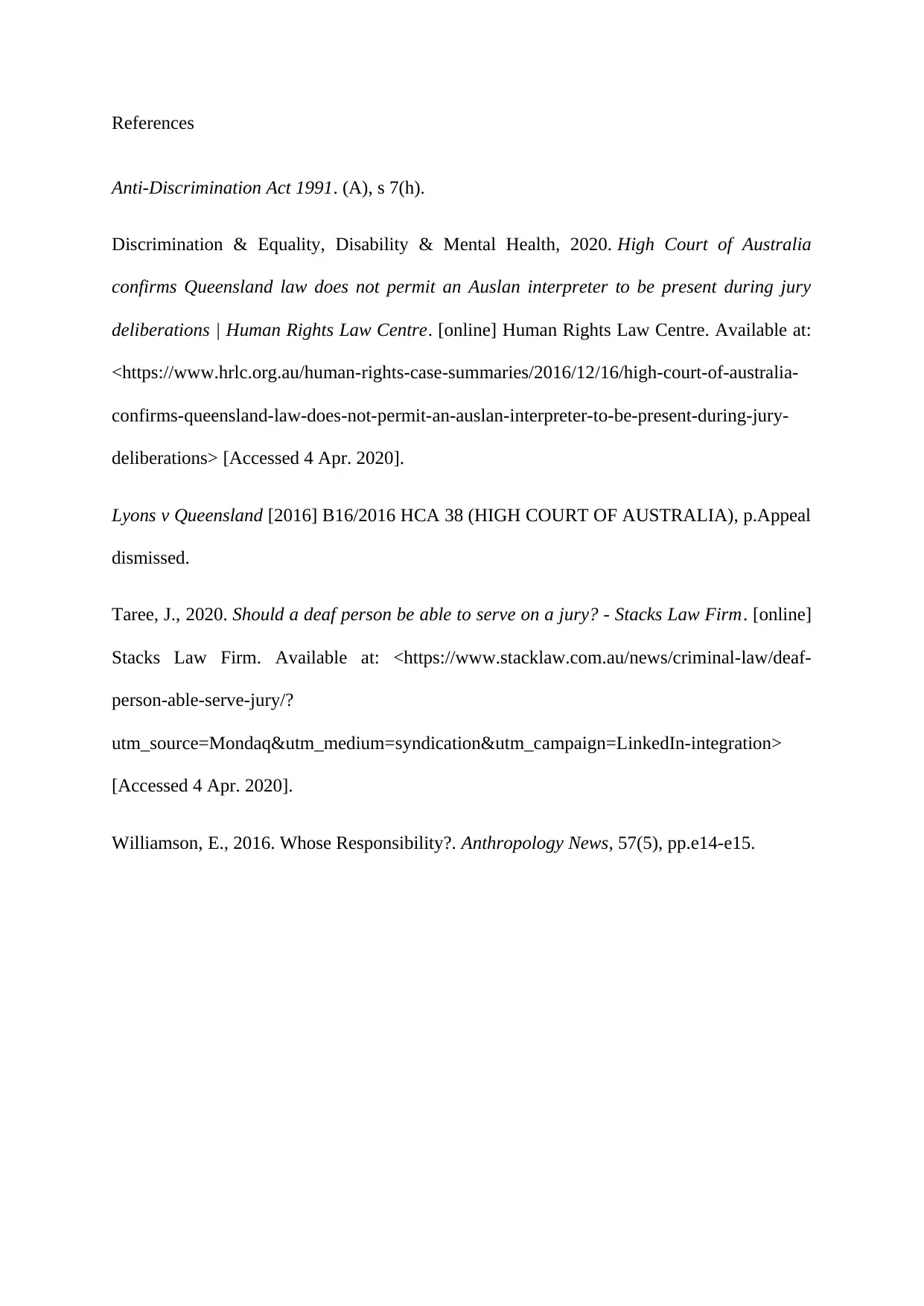
References
Anti-Discrimination Act 1991. (A), s 7(h).
Discrimination & Equality, Disability & Mental Health, 2020. High Court of Australia
confirms Queensland law does not permit an Auslan interpreter to be present during jury
deliberations | Human Rights Law Centre. [online] Human Rights Law Centre. Available at:
<https://www.hrlc.org.au/human-rights-case-summaries/2016/12/16/high-court-of-australia-
confirms-queensland-law-does-not-permit-an-auslan-interpreter-to-be-present-during-jury-
deliberations> [Accessed 4 Apr. 2020].
Lyons v Queensland [2016] B16/2016 HCA 38 (HIGH COURT OF AUSTRALIA), p.Appeal
dismissed.
Taree, J., 2020. Should a deaf person be able to serve on a jury? - Stacks Law Firm. [online]
Stacks Law Firm. Available at: <https://www.stacklaw.com.au/news/criminal-law/deaf-
person-able-serve-jury/?
utm_source=Mondaq&utm_medium=syndication&utm_campaign=LinkedIn-integration>
[Accessed 4 Apr. 2020].
Williamson, E., 2016. Whose Responsibility?. Anthropology News, 57(5), pp.e14-e15.
Anti-Discrimination Act 1991. (A), s 7(h).
Discrimination & Equality, Disability & Mental Health, 2020. High Court of Australia
confirms Queensland law does not permit an Auslan interpreter to be present during jury
deliberations | Human Rights Law Centre. [online] Human Rights Law Centre. Available at:
<https://www.hrlc.org.au/human-rights-case-summaries/2016/12/16/high-court-of-australia-
confirms-queensland-law-does-not-permit-an-auslan-interpreter-to-be-present-during-jury-
deliberations> [Accessed 4 Apr. 2020].
Lyons v Queensland [2016] B16/2016 HCA 38 (HIGH COURT OF AUSTRALIA), p.Appeal
dismissed.
Taree, J., 2020. Should a deaf person be able to serve on a jury? - Stacks Law Firm. [online]
Stacks Law Firm. Available at: <https://www.stacklaw.com.au/news/criminal-law/deaf-
person-able-serve-jury/?
utm_source=Mondaq&utm_medium=syndication&utm_campaign=LinkedIn-integration>
[Accessed 4 Apr. 2020].
Williamson, E., 2016. Whose Responsibility?. Anthropology News, 57(5), pp.e14-e15.
1 out of 6
Your All-in-One AI-Powered Toolkit for Academic Success.
+13062052269
info@desklib.com
Available 24*7 on WhatsApp / Email
![[object Object]](/_next/static/media/star-bottom.7253800d.svg)
Unlock your academic potential
© 2024 | Zucol Services PVT LTD | All rights reserved.

